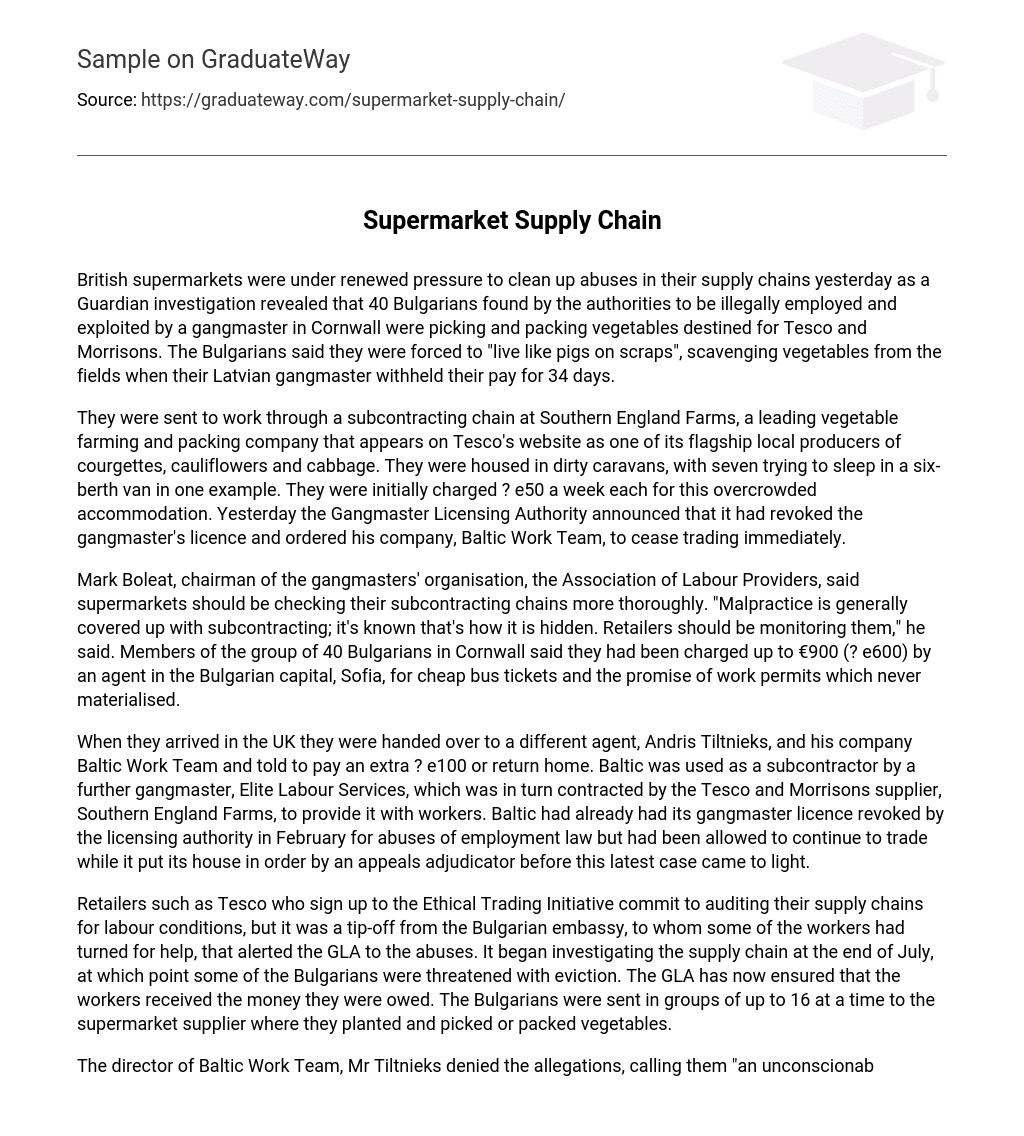British supermarkets were under renewed pressure to clean up abuses in their supply chains yesterday as a Guardian investigation revealed that 40 Bulgarians found by the authorities to be illegally employed and exploited by a gangmaster in Cornwall were picking and packing vegetables destined for Tesco and Morrisons. The Bulgarians said they were forced to “live like pigs on scraps”, scavenging vegetables from the fields when their Latvian gangmaster withheld their pay for 34 days.
They were sent to work through a subcontracting chain at Southern England Farms, a leading vegetable farming and packing company that appears on Tesco’s website as one of its flagship local producers of courgettes, cauliflowers and cabbage. They were housed in dirty caravans, with seven trying to sleep in a six-berth van in one example. They were initially charged ? e50 a week each for this overcrowded accommodation. Yesterday the Gangmaster Licensing Authority announced that it had revoked the gangmaster’s licence and ordered his company, Baltic Work Team, to cease trading immediately.
Mark Boleat, chairman of the gangmasters’ organisation, the Association of Labour Providers, said supermarkets should be checking their subcontracting chains more thoroughly. “Malpractice is generally covered up with subcontracting; it’s known that’s how it is hidden. Retailers should be monitoring them,” he said. Members of the group of 40 Bulgarians in Cornwall said they had been charged up to €900 (? e600) by an agent in the Bulgarian capital, Sofia, for cheap bus tickets and the promise of work permits which never materialised.
When they arrived in the UK they were handed over to a different agent, Andris Tiltnieks, and his company Baltic Work Team and told to pay an extra ? e100 or return home. Baltic was used as a subcontractor by a further gangmaster, Elite Labour Services, which was in turn contracted by the Tesco and Morrisons supplier, Southern England Farms, to provide it with workers. Baltic had already had its gangmaster licence revoked by the licensing authority in February for abuses of employment law but had been allowed to continue to trade while it put its house in order by an appeals adjudicator before this latest case came to light.
Retailers such as Tesco who sign up to the Ethical Trading Initiative commit to auditing their supply chains for labour conditions, but it was a tip-off from the Bulgarian embassy, to whom some of the workers had turned for help, that alerted the GLA to the abuses. It began investigating the supply chain at the end of July, at which point some of the Bulgarians were threatened with eviction. The GLA has now ensured that the workers received the money they were owed. The Bulgarians were sent in groups of up to 16 at a time to the supermarket supplier where they planted and picked or packed vegetables.
The director of Baltic Work Team, Mr Tiltnieks denied the allegations, calling them “an unconscionable lie”. He has three weeks in which to appeal against the GLA ruling. The director of Elite told the Guardian he believed the Bulgarians had the right to work in the UK and that he had made all the correct payments. SEF’s managing director, Greville Richards, said his company was a responsible employer which had checked its agencies were paying correctly. “SEF is very disappointed to hear about the allegations made against this subcontracted labour provider,” he said.
Tesco said it expected all its suppliers to meet strict, independently audited criteria for labour standards and to manage their agencies responsibly. Morrisons said it took the issues very seriously and used reputable suppliers. Bulgarians and Romanians may currently work as self-employed migrants or with special agricultural sector permits but may not be otherwise employed. A Home Office spokeswoman said the government was already collecting evidence on the impact of the restrictions to see if the rules should be amended.





